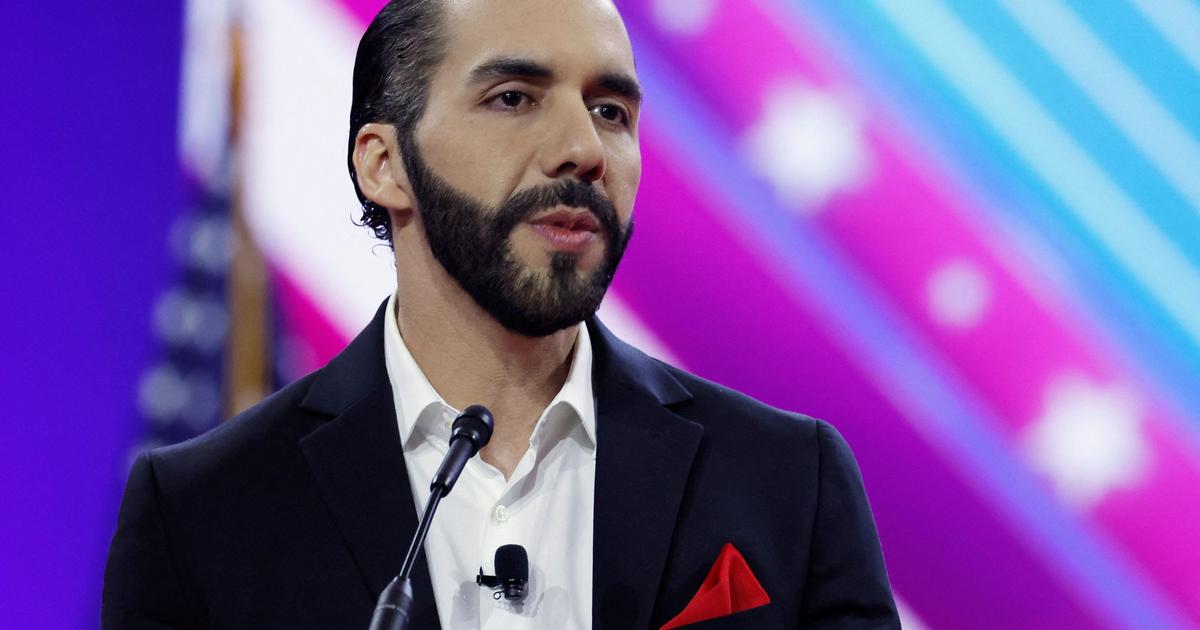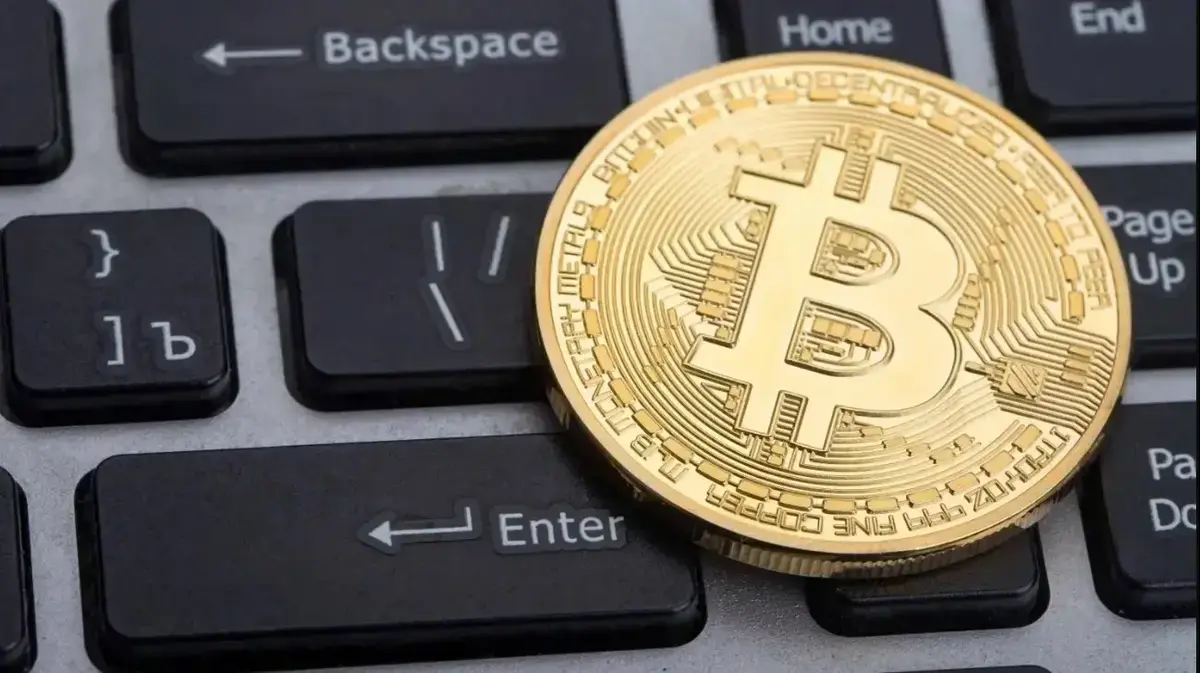Icon: enlarge
Bitcoin:
price slide after record rally
Photo: Rick Bowmer / AP / dpa
The Bitcoin soaring was suddenly interrupted on Monday.
After the record of just under $ 58,000 on Sunday, the cryptocurrency gave way again at the beginning of the week and temporarily fell below the $ 52,000 mark.
Bitcoin was last listed at $ 51,800 on the Bitstamp trading platform - a loss of more than 10 percent within a few hours.
On Sunday, Bitcoin's total market capitalization had risen to more than $ 1 trillion, but profit-taking is now increasing.
Interview with crypto investor:
From $ 50,000 to $ 30 million - "you have to cope with that first"
Tesla boss Elon Musk, who invested $ 1.5 billion in company money in Bitcoin in January, fueled demand on Friday with another tweet: If conventional currencies such as dollars or euros are subject to negative interest rates, "only one would be Don't look foolish for alternatives, "wrote Musk.
The Bitcoin price continued to rise and reached a record high of just under 58,000 US dollars.
Two days earlier, other Bitcoin pushers such as Microstrategy boss Michael Saylor had confirmed that they would continue to invest in Bitcoin on a large scale.
The approval of a Bitcoin ETF in Canada is also fueling the hope of many investors that such a listed fund will soon also be launched in the USA.
In Europe, such a Bitcoin ETF has so far been offered by the Swiss bank Vontobel.
Bitcoin has been flying high for weeks and months, and has recently accelerated again.
Bitcoin had cost around $ 25,000 at Christmas.
In late summer, the rate was around $ 10,000.
The US electric car manufacturer Tesla intends to accept the digital currency as a means of payment in the future.
Musk himself repeatedly drew attention to the digital currency via Twitter.
Tesla's commitment raises hope that other companies could follow suit, which would increase the adoption of Bitcoin.
The credit card company Mastercard no longer seems averse to crypto money.
Raj Dhamodharan, responsible for digital assets at Mastercard, wrote in a blog last week that the company wanted to allow transactions with selected cryptocurrencies.
In addition, they are in close contact with central banks that are working on their own digital currencies.
Photo: Jens Kalaene / dpa
Photo gallery
These CEOs gamble with Bitcoin
Icon: Gallery
And more and more professional investors are looking to the digital currency.
It was leaked over the weekend that the US bank Morgan Stanley was considering adding Bitcoin to the list of possible investments through its investment company.
Even if many banks are still reluctant to deal with Bitcoin, reports like last week could spur more and more financial service providers to adopt and use digital assets more quickly, believes Patrick Campos, chief strategy officer at Securrency, a developer of blockchain-based financial technology.
In particular, the - not undisputed - announcement by Tesla could encourage other large companies and institutions to accept cryptocurrencies "not only as a worthy, but perhaps even as an essential asset class," Bloomberg quoted the experts as saying on Sunday.
The most important cryptocurrencies in the world
Bitcoin Up Arrow Down Arrow
Bitcoin is by far the oldest and best-known digital currency.
With currently around 60 percent, it also has the largest market share of the currently around 7,000 crypto currencies.
Bitcoin was created at the time of the financial crisis in 2008. Its inventor is still only known by an alias.
The most important features of Bitcoin are its decentralized organization and the use of the
"blockchain"
database technology
.
Both together ensure a high degree of anonymity for Bitcoin users: payments in Bitcoin are practically impossible to track.
Ether Up arrow Down arrow
Ether is the second largest digital currency in the world after Bitcoin.
Their market share is just over ten percent.
One of the characteristics of Ether is the decentralized organization of the underlying
Etherum
network
.
On the other hand - and this is an important difference to Bitcoin - one focus of Ether is on "intelligent contracts".
These so-called smart contracts are basically small computer programs that can virtually automatically execute contracts after payment has been processed.
Similar to the blockchain database technology, smart contracts are predicted to have a great future.
Tether Up Arrow Down Arrow
Tether is one of the "stable coins", the value of which is guaranteed by backing them with classic investments.
In the case of Tether, it is the world's largest currency, the
US dollar
.
However, this violates an important idea of the cryptocurrency concept, namely independence from state institutions.
Nevertheless - or maybe because of it - Tether is very popular.
One advantage of the link to the US dollar is that the exchange rate fluctuates less than other digital currencies.
However, in recent years there have been repeated doubts as to whether the alleged US dollar coverage is true.
Libra Up Arrow Down Arrow
Similar to Tether, Libra is a digital currency based on the "stable coins" principle, but with two huge differences.
First: it doesn't even exist yet.
Second: Behind Libra is
Facebook,
one of the most powerful technology companies in the world.
The idea of Libra is to give a digital currency a commercial breakthrough on a broad front.
The problem: State institutions are not at all enthusiastic about it.
It is true that governments and central banks have long been investigating how they can make use of the concept of digital currencies.
But you don't like to be taken out of your hand.
The
"Libra Association"
initiated by Facebook has met with correspondingly great resistance
with its project.
Digital yuan Up arrow Down arrow
China has
long been working
on the digital version of its currency, the yuan or renminbi.
The project is in clear contrast to the liberal ideas that the masterminds of digital currencies once had.
Because a state uncontrolled, decentralized currency with anonymized payment processes is certainly not what the political leadership of the People's Republic has in mind.
On the contrary, it is more likely to be more interested in monitoring payment processes and related transactions as closely as possible.
The digital yuan can thus be seen as a kind of counter-draft to the original crypto currency Bitcoin.
Source: dpa-afx
The crypto currency boom is fueled not least by the glut of money from central banks and important industrialized countries.
During the Corona crisis, the central banks made their monetary policy, which was already loose, much more generous.
The states support consumers and companies with high spending, which increases the national debt burden sharply.
This development could result in increased inflation that would devalue traditional currencies.
Some investors are therefore increasingly asking for alternative investments such as digital currencies.
with agencies









